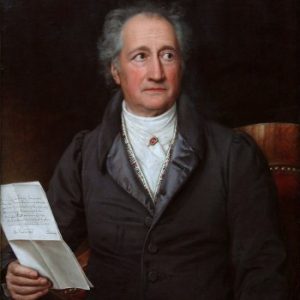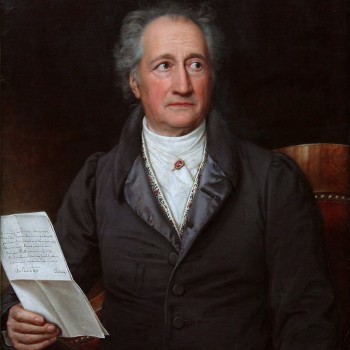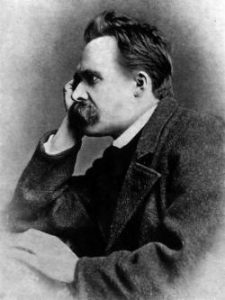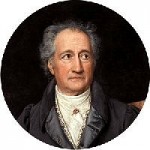Fleurs du Mal Magazine


Or see the index

Der Sänger
Was hör ich draußen vor dem Tor,
Was auf der Brücke schallen?
Laß den Gesang vor unserm Ohr
Im Saale widerhallen!
Der König sprachs, der Page lief;
Der Knabe kam, der König rief:
Laßt mir herein den Alten!
Gegrüßet seid mir, edle Herrn,
Gegrüßt ihr, schöne Damen!
Welch reicher Himmel, Stern bei Stern!
Wer kennet ihre Namen?
Im Saal voll Pracht und Herrlichkeit
Schließt, Augen, euch; hier ist nicht Zeit,
Sich staunend zu ergetzen.
Der Sänger drückt’ die Augen ein
Und schlug in vollen Tönen;
Die Ritter schauten mutig drein,
Und in den Schoß die Schönen.
Der König, dem das Lied gefiel,
Ließ, ihn zu ehren für sein Spiel,
Eine goldne Kette holen.
Die goldne Kette gib mir nicht,
Die Kette gib den Rittern,
Vor deren kühnem Angesicht
Der Feinde Lanzen splittern;
Gib sie dem Kanzler, den du hast,
Und laß ihn noch die goldne Last
Zu andern Lasten tragen.
Ich singe, wie der Vogel singt,
Der in den Zweigen wohnet;
Das Lied, das aus der Kehle dringt,
Ist Lohn, der reichlich lohnet.
Doch darf ich bitten, bitt ich eins:
Laß mir den besten Becher Weins
In purem Golde reichen.
Er setzt’ ihn an, er trank ihn aus:
O Trank voll süßer Labe!
O wohl dem hochbeglückten Haus,
Wo das ist kleine Gabe!
Ergehts euch wohl, so denkt an mich,
Und danket Gott so warm, als ich
Für diesen Trunk euch danke.
Johann Wolfgang von Goethe
(1749-1832)
Der Sänger
•fleursdumal.nl magazine
More in: # Music Archive, Archive G-H, Archive G-H, Goethe, Johann Wolfgang von, J.W. von Goethe

Eins und Alles
Im Grenzenlosen sich zu finden,
Wird gern der Einzelne verschwinden,
Da löst sich aller Überdruß;
Statt heißem Wünschen, wildem Wollen,
Statt läst’gem Fordern, strengem Sollen
Sich aufzugeben ist Genuß.
Weltseele, komm’ uns zu durchdringen!
Dann mit dem Weltgeist selbst zu ringen
Wird unsrer Kräfte Hochberuf.
Teilnehmend führen gute Geister,
Gelinde leitend, höchste Meister,
Zu dem, der alles schafft und schuf.
Und umzuschaffen das Geschaffne,
Damit sich’s nicht zum Starren waffne,
Wirkt ewiges lebend’ges Tun.
Und was nicht war, nun will es werden
Zu reinen Sonnen, farbigen Erden,
In keinem Falle darf es ruhn.
Es soll sich regen, schaffend handeln,
Erst sich gestalten, dann verwandeln;
Nur scheinbar steht’s Momente still.
Das Ewige regt sich fort in allen:
Denn alles muß in Nichts zerfallen,
Wenn es im Sein beharren will.
Johann Wolfgang von Goethe
(1749-1832)
Eins und Alles
•fleursdumal.nl magazine
More in: Archive G-H, Archive G-H, Goethe, Johann Wolfgang von, J.W. von Goethe

Philine
Singet nicht in Trauertönen
Von der Einsamkeit der Nacht!
Nein, sie ist, o holde Schönen,
Zur Geselligkeit gemacht.
Wie das Weib dem Mann gegeben
Als die schönste Hälfte war,
Ist die Nacht das halbe Leben,
Und die schönste Hälfte zwar.
Könnt ihr euch des Tages freuen,
Der nur Freuden unterbricht?
Er ist gut, sich zu zerstreuen;
Zu was anderm taugt er nicht.
Aber wenn in nächt′ger Stunde
Süßer Lampe Dämmrung fließt,
Und vom Mund zum nahen Munde
Scherz und Liebe sich ergießt;
Wenn der rasche lose Knabe,
Der sonst wild und feurig eilt,
Oft bei einer kleinen Gabe
Unter leichten Spielen weilt;
Wenn die Nachtigall Verliebten
Liebevoll ein Liedchen singt,
Das Gefangnen und Betrübten
Nur wie Ach und Wehe klingt:
Mit wie leichtem Herzensregen
Horchet ihr der Glocke nicht,
Die mit zwölf bedächt′gen Schlägen
Ruh′ und Sicherheit verspricht!
Darum an dem langen Tage
Merke dir es, liebe Brust:
Jeder Tag hat seine Plage,
Und die Nacht hat ihre Lust.
Johann Wolfgang von Goethe
(1749-1832)
Philine
•fleursdumal.nl magazine
More in: Archive G-H, Archive G-H, Goethe, Johann Wolfgang von, J.W. von Goethe

Totentanz
Der Türmer, der schaut zu Mitten der Nacht
Hinab auf die Gräber in Lage;
Der Mond, der hat alles ins Helle gebracht;
Der Kirchhof, er liegt wie am Tage.
Da regt sich ein Grab und ein anderes dann:
Sie kommen hervor, ein Weib da, ein Mann,
In weißen und schleppenden Hemden.
Das reckt nun, es will sich ergetzen sogleich,
Die Knöchel zur Runde, zum Kranze,
So arm und so jung, und so alt und so reich;
Doch hindern die Schleppen am Tanze.
Und weil hier die Scham nun nicht weiter gebeut,
Sie schütteln sich alle, da liegen zerstreut
Die Hemdlein über den Hügeln.
Nun hebt sich der Schenkel, nun wackelt das Bein,
Gebärden da gibt es vertrackte;
Dann klippert’s und klappert’s mitunter hinein,
Als schlüg’ man die Hölzlein zum Takte.
Das kommt nun dem Türmer so lächerlich vor;
Da raunt ihm der Schalk, der Versucher, ins Ohr:
Geh! hole dir einen der Laken.
Getan wie gedacht! und er flüchtet sich schnell
Nun hinter geheiligte Türen.
Der Mond, und noch immer er scheinet so hell
Zum Tanz, den sie schauderlich führen.
Doch endlich verlieret sich dieser und der,
Schleicht eins nach dem andern gekleidet einher,
Und, husch, ist es unter dem Rasen.
Nur einer, der trippelt und stolpert zuletzt
Und tappet und grapst an den Grüften;
Doch hat kein Geselle so schwer ihn verletzt,
Er wittert das Tuch in den Lüften.
Er rüttelt die Turmtür, sie schlägt ihn zurück,
Geziert und gesegnet, dem Türmer zum Glück,
Sie blinkt von metallenen Kreuzen.
Das Hemd muß er haben, da rastet er nicht,
Da gilt auch kein langes Besinnen,
Den gotischen Zierat ergreift nun der Wicht
Und klettert von Zinne zu Zinnen.
Nun ist’s um den armen, den Türmer getan!
Es ruckt sich von Schnörkel zu Schnörkel hinan,
Langbeinigen Spinnen vergleichbar.
Der Türmer erbleichet, der Türmer erbebt,
Gern gäb er ihn wieder, den Laken.
Da häkelt – jetzt hat er am längsten gelebt –
Den Zipfel ein eiserner Zacken.
Schon trübet der Mond sich verschwindenden Scheins,
Die Glocke, sie donnert ein mächtiges Eins,
Und unten zerschellt das Gerippe.
Johann Wolfgang von Goethe
(1749-1832)
Totentanz
•fleursdumal.nl magazine
More in: Archive G-H, Archive G-H, Goethe, Johann Wolfgang von, J.W. von Goethe

Neue Liebe, neues Leben
Herz, mein Herz, was soll das geben?
Was bedränget dich so sehr?
Welch ein fremdes, neues Leben !
Ich erkenne dich nicht mehr.
Weg ist alles was du liebtest,
Weg, warum du dich betrübtest,
Weg dein Fleiß und deine Ruh –
Ach, wie kamst du nur dazu !
Fesselt dich die Jugendblüte,
Diese liebliche Gestalt,
Dieser Blick voll Treu und Güte
Mit unendlicher Gewalt?
Will ich rasch mich ihr entziehen,
Mich ermannen, ihr entfliehen,
Führet mich im Augenblick,
Ach, mein Weg zu ihr zurück.
Und an diesem Zauberfädchen,
Das sich nicht zerreißen lässt,
Hält das liebe lose Mädchen
Mich so wider Willen fest;
Muss in ihrem Zauberkreise
Leben nun auf ihre Weise.
Die Veränderung, ach, wie groß!
Liebe! Liebe! Laß mich los!
Johann Wolfgang von Goethe
(1749-1832)
Neue Liebe, neues Leben
•fleursdumal.nl magazine
More in: Archive G-H, Archive G-H, Goethe, Johann Wolfgang von, J.W. von Goethe

An Goethe
Das Unvergängliche
Ist nur dein Gleichnis!
Gott der Verfängliche
Ist Dichter-Erschleichnis…
Welt-Rad, das rollende,
Streift Ziel auf Ziel:
Not – nennt′ s der Grollende,
Der Narr nennt′ s – Spiel…
Welt-Spiel, das herrische,
Mischt Sein und Schein: –
Das Ewig-Närrische
Mischt uns – hinein!…
Friedrich Nietzsche
(1844 – 1900)
An Goethe
• fleursdumal.nl magazine
More in: Archive M-N, Archive M-N, Friedrich Nietzsche, Goethe, Johann Wolfgang von, Nietzsche
Eline Arbo, nieuwe maakster bij Toneelschuur Producties, bewerkt voor deze eerste voorstelling zelf de klassieke roman van Johann Wolfgang von Goethe, waarin Werther vecht voor zijn ideale liefde.
 En zij daagt je uit na te denken over: Waar geloof ik in? En hoe ver ben ik bereid daarvoor te gaan?
En zij daagt je uit na te denken over: Waar geloof ik in? En hoe ver ben ik bereid daarvoor te gaan?
Tijdens zijn verblijf op het platteland wordt Werther hevig verliefd op Lotte, een meisje dat al verloofd is met Albert. Hij gooit zijn hartstocht volledig in de strijd. Wanneer zijn liefde voor Lotte onbeantwoord blijft, ziet hij geen andere uitweg dan de dood.
Goethes eerste roman is na zijn publicatie in 1774, te midden van de ‘Sturm und Drang’-periode, direct een ongekend succes en leidt tot een heuse ‘Werther-Fieber’ onder jongvolwassenen: mannen herkennen zich in zijn verhaal, kleden zich identiek aan hun held en een golf van zelfmoorden raast door Europa.
Eline Arbo over ‘Het lijden van de jonge Werther’
“Ik ben gefascineerd door de stelligheid van Werther om het gevoel als richtlijn voor zijn handelen te gebruiken. Hij is volhardend in zijn houding – met de dood tot gevolg. Is hij een hysterische egoïst of ligt er juist kracht in Werthers irrationele levenswijze? Juist die spanning tussen gevoel en verstand vind ik interessant en wil ik in deze voorstelling onderzoeken.”
Eline Arbo studeerde in de zomer van 2016 af aan de Regie Opleiding van de Amsterdamse Hogeschool voor de Kunsten en viel daar op met haar afstudeervoorstellingen Manifesten en Antigone. Arbo onderzoekt in haar voorstellingen sociaal maatschappelijke thema’s via eigenzinnige concepten.
regie Eline Arbo tekst Johann Wolfgang von Goethe bewerking Eline Arbo gebaseerd op de vertaling van Thérèse Cornips (© 1975 Stichting Thérèse Cornips) met Diewertje Dir, Sander Plukaard, Victor IJdens decor Juul Dekker kostuums Sarah Nixon licht Varja Klosse dramaturgie Thomas Lamers muzikaal leider Thijs van Vuure met dank aan Sofie de Wilde, Roos Matla, Saar Scheerlings, Sarah Lefevre, Eva Bosma, Huib Nelissen Decorbouw
 Het lijden van de jonge Werther, theater
Het lijden van de jonge Werther, theater
Van: Johann Wolfgang von Goethe
Door: Toneelschuur Producties
Regie: Eline Arbo.
23/9, Toneelschuur, Haarlem.
Tournee t/m 19/10.
vr 06 okt 2017
Den Haag
Theater aan het Spui
wo 18 okt t/m
do 19 okt 2017
Amsterdam
Theater Bellevue
‘Een groot expressionistisch theaterfeest’ ★★★★★ Volkskrant
‘Prachtige vondsten in overtuigend debuut’ Haarlems Dagblad
# Meer info website toneelschuur
Toneelschuur Producties / Eline Arbo:
Het lijden van de jonge Werther, theater
Van Johann Wolfgang von Goethe
fleursdumal.nl magazine
More in: Archive G-H, Art & Literature News, Goethe, Johann Wolfgang von, J.W. von Goethe, THEATRE, TRANSLATION ARCHIVE

Johann Wolfgang von Goethe
(1749-1832)
Den Guten
Laßt euch einen Gott begeisten,
Euch beschränket nur mein Sagen.
Was ihr könnt, ihr werdet’s leisten,
Aber müßt mich nur nicht fragen.
Johann Wolfgang von Goethe poetry
fleursdumal.nl magazine
More in: Archive G-H, Goethe, Johann Wolfgang von
Johann Wolfgang von Goethe
(1749-1832)
Drei Oden
an meinen Freund Behrisch
Erste.
Verpflanze den schönen Baum,
Gärtner! er jammert mich;
Glücklicheres Erdreich
Verdiente der Stamm.
Noch hat seiner Natur Kraft
Der Erde aussaugendem Geize,
Der Luft verderbender Fäulniß,
Ein Gegengift, widerstanden.
Sieh! wie er im Frühling
Lichtgrüne Blätter schlägt;
Ihr Orangenduft
Ist dem Geschmeiße Gift.
Der Raupe tückischer Zahn
Wird stumpf an ihnen,
Es blinkt ihr Silberglanz
Im Sonnenscheine.
Von seinen Zweigen
Wünscht das Mädchen
Im Brautkranze;
Früchte hoffen Jünglinge.
Aber sieh! der Herbst kommt,
Da geht die Raupe,
Klagt der listigen Spinne
Des Baums Unverwelklichkeit.
Schwebend zieht sich
Von ihrer Taxuswohnung
Die Prachtfeindin herüber
Zum wohlthätigen Baum,
Und kann nicht schaden,
Aber die Vielkünstliche
Ueberzieht mit grauem Ekel
Die Silberblätter.
Sieht triumphirend,
Wie das Mädchen schauernd,
Der Jüngling jammernd
Vorübergeht.
Verpflanze den schönen Baum,
Gärtner! er jammert mich.
Baum, danke dem Gärtner,
Der dich verpflanzt!
Zweite.
Du gehst! Ich murre. –
Geh! laß mich murren.
Ehrlicher Mann,
Fliehe dieses Land!
Todte Sümpfe,
Dampfende Octobernebel
Verweben ihre Ausflüsse
Hier unzertrennlich.
Gebärort
Schädlicher Insecten,
Mörderhöhle
Ihrer Bosheit!
Am schilfigten Ufer
Liegt die wollüstige
Flammengezüngte Schlange,
Gestreichelt vom Sonnenstrahl.
Fliehe sanfte Nachtgänge
In der Mondendämmerung,
Dort halten zuckende Kröten
Zusammenkünfte auf Kreuzwegen.
Schaden sie nicht,
Werden sie schrecken. –
Ehrlicher Mann,
Fliehe dieses Land!
Dritte.
Sei gefühllos!
Ein leichtbewegtes Herz
Ist ein elend Gut
Auf der wankenden Erde.
Behrisch! des Frühlings Lächeln
Erheitre deine Stirne nie;
Nie trübt sie dann mit Verdruß
Des Winters stürmischer Ernst.
Lehne dich nie an des Mädchens
Sorgenverwiegende Brust,
Nie auf des Freundes
Elendtragenden Arm.
Schon versammelt,
Von seiner Klippenwarte,
Der Neid auf dich
Den ganzen luchsgleichen Blick,
Dehnt die Klauen,
Stürzt, und schlägt
Hinterlistig sie
Dir in die Schultern.
Stark sind die magern Arme
Wie Pantherarme,
Er schüttelt dich
Und reißt dich los.
Tod ist Trennung!
Dreifacher Tod
Trennung ohne Hoffnung
Wiederzusehn.
Gerne verließest du
Dieses gehaßte Land,
Hielte dich nicht Freundschaft
Mit Blumenfesseln an mir.
Zerreiß sie! Ich klage nicht.
Kein edler Freund
Hält den Mitgefangnen,
Der fliehen kann, zurück.
Der Gedanke
Von des Freundes Freiheit
Ist ihm Freiheit
Im Kerker.
Du gehst, ich bleibe.
Aber schon drehen
Des letzten Jahres Flügelspeichen
Sich um die rauchende Achse.
Ich zähle die Schläge
Des donnernden Rads,
Segne den letzten,
Da springen die Riegel, frei bin ich wie du!
Johann Wolfgang von Goethe poetry
fleursdumal.nl magazine
More in: Archive G-H, Goethe, Johann Wolfgang von

Johann Wolfgang von Goethe
(1749-1832)
Dämmrung senkte sich von oben
Dämmrung senkte sich von oben,
Schon ist alle Nähe fern;
Doch zuerst emporgehoben
Holden Lichts der Abendstern!
Alles schwankt ins Ungewisse,
Nebel schleichen in die Höh;
Schwarzvertiefte Finsternisse
Widerspiegelnd ruht der See.
Nun im östlichen Bereiche
Ahnd ich Mondenglanz und -glut,
Schlanker Weiden Haargezweige
Scherzen auf der nächsten Flut.
Durch bewegter Schatten Spiele
Zittert Lunas Zauberschein
Und durchs Auge schleicht die Kühle
Sänftigend ins Herz hinein.
Johann Wolfgang von Goethe poetry
fleursdumal.nl magazine
More in: Archive G-H, Goethe, Johann Wolfgang von

Johann Wolfgang von Goethe
(1749-1832)
Den Originalen
Ein Quidam sagt: »Ich bin von keiner Schule;
Kein Meister lebt, mit dem ich buhle;
Auch bin ich weit davon entfernt,
Daß ich von Toten was gelernt.«
Das heißt, wenn ich ihn recht verstand:
»Ich bin ein Narr auf eigne Hand.«
Johann Wolfgang von Goethe poetry
fleursdumal.nl magazine
More in: Archive G-H, Goethe, Johann Wolfgang von

The Sorrows of Young Werther (73 = The end) by J.W. von Goethe The house, the neighbourhood, and the whole town were immediately in commotion. Albert arrived. They had laid Werther on the bed: his head was bound up, and the paleness of death was upon his face. His limbs were motionless; but he still breathed, at one time strongly, then weaker--his death was momently expected. He had drunk only one glass of the wine. "Emilia Galotti" lay open upon his bureau. I shall say nothing of Albert's distress, or of Charlotte's grief.The old steward hastened to the house immediately upon hearing the news: he embraced his dying friend amid a flood of tears. His eldest boys soon followed him on foot. In speechless sorrow they threw themselves on their knees by the bedside, and kissed his hands and face. The eldest, who was his favourite, hung over him till he expired; and even then he was removed by force. At twelve o'clock Werther breathed his last. The presence of the steward, and the precautions he had adopted, prevented a disturbance; and that night, at the hour of eleven, he caused the body to be interred in the place which Werther had selected for himself. The steward and his sons followed the corpse to the grave. Albert was unable to accompany them. Charlotte's life was despaired of. The body was carried by labourers. No priest attended. THE END The Sorrows of Young Werther (Die Leiden des jungen Werther) by J.W. von Goethe. Translated by R.D. Boylan. fleursdumal.nl magazine
More in: -Die Leiden des jungen Werther, Goethe, Johann Wolfgang von
Thank you for reading Fleurs du Mal - magazine for art & literature